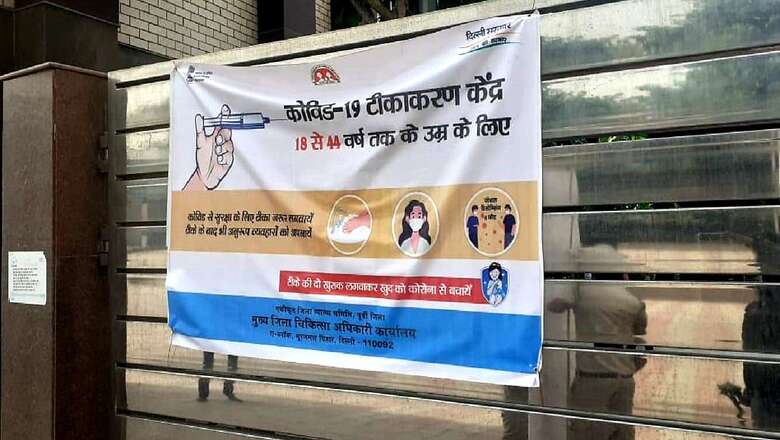
views
On March 11, 2020, the World Health Organization (WHO) declared the Covid-19 spread as a pandemic. Since then, vaccine research has progressed at “pandemic speed”. And exactly nine months later, on December 11, the first Covid-19 vaccine — the one by Pfizer-BioNTech — received emergency use authorisation in the US.
In the absence of any specific treatment, the focus in the fight against the deadly infection has been on testing and preventing its spread. But with a calamitous second wave hitting India and a third wave looming, vaccinations remain the only hope of controlling this disease.
Scaling up production of vaccines to meet worldwide demand will have its own time lines. The limited availability of doses, at least initially, will necessitate the prioritisation of available vaccines. This would be to ensure maximisation of benefits of vaccination to both individual recipients and the population overall. Accordingly, vaccination was opened on January 16, 2021, for health care workers and essential service providers in India. Thereafter, in a phased manner, for senior citizens and those above 45 years. And only recently, for all above 18 years.
As of May 5, 2021, India’s cumulative vaccine coverage exceeded 16,25,00,000 with the drive being expanded to include all adults. But the vaccination programme has run into roadblocks with several states complaining of severe supply shortage and some cities putting the drive on hold. Vaccine hesitancy among adults is another limitation. Unless efforts are further energised to rapidly cover a large section of the population, it is a long road to achieve herd immunity, which is the aim of immunisation programmes.
Children, being a significant part of the population, are naturally a major section to be targeted. The 2011 census data reveals that about 35% of the population is in the age group of 0-14 years and another 10% between 15 and 19 years. Moreover, children are recognised as very subtle vectors of the disease. Since they cannot be easily identified as sources of contagion and isolated, they represent a big threat to the most vulnerable.
Concerns were raised about the ethical consideration of implementing a vaccination policy that targets children in order to protect the elderly. The widespread perception, till recently, was that Covid-19 affects children much less than other population groups. This is because relatively few children have died of Covid-19-related complications or have developed severe symptoms, or any symptoms at all. Recent trends seem to tell a different story.
The second wave, which caught us unprepared and overwhelmed the health care system, is also notable due to an increased virulence, leading to more infections in children and a higher mortality in the younger population as compared with the first wave. In March-April 2021, the number of infections reported among children has surged. Additionally, the number of children with Covid-19 needing hospitalisation and intensive care has significantly gone up. This has brought children (or an additional 40% of the population) directly into the segment of patients suffering from Covid-19 infection who would need significant medical care. This undoubtedly paves the way for an immediate vaccination programme for children and adolescents in India.
The process of vaccinating children is likely to be a much easier administrative experience as compared to adult vaccination. Vaccinating children is a regular procedure, both in private as well as government facilities. The sustained success of the pulse polio programme as well the more recent MMR programme has ensured our child vaccination machinery is well-oiled. Moreover, the routine universal immunisation programme, which seems to have taken a back seat amidst the pandemic, can be revitalised along with Covid-19 immunisation for children.
Finally, we come to the safety and effectivity. We know that no vaccine is 100% safe and 100% effective. The Covid-19 vaccines are no exception. Human trials will need to demonstrate an acceptable level of safety and effectiveness on children and adolescents. Pfizer has tested its vaccine on the age group above 12 years of age (Canada has approved it for the 12-15 age group). The Oxford vaccine is being tested on children aged 5-12. Other vaccine developers have commenced trials in children above six months of age. As long as the overall benefits of protection far outweigh the miniscule hazards, as applicable to all established vaccines, Covid-19 vaccination for children would be a sound strategy to protect children, as well as hasten herd immunity and prevent a feared third wave. In countries that have vaccinated a large proportion of residents, the number of new cases is declining, often sharply. This is reflected in the situation in Israel, the United Arab Emirates and Britain.
The Indian Academy of Pediatrics (IAP) has over 30,000 pediatrician members across 30 state branches and 337 city and district branches, covering almost the entire country. Utilisation of this dedicated and trained manpower could contribute significantly in improving and hastening the population coverage of Covid vaccines, especially for children. For instance, the allotment, of say a thousand doses, to each pediatrician to vaccinate those related to his/her practice, i.e. the children as well as adult family members of the children in his/her practice could be a game-changer in scaling up the numbers enormously almost overnight. Moreover, this would not require any new infrastructure or training — both of which take time and are open to teething troubles and error. Acceptability to vaccines is far more prevalent for children than adults; ramping up the section of population under vaccine cover would be far more rapid by vaccinating children. This is likely to improve the overall acceptance and delivery of Covid-19 vaccine. Parents trust pediatricians with vaccinating their little ones; they would be just as comfortable taking one from their pediatrician.
A huge increase in the numbers of protected beneficiaries may boost herd immunity and the unchecked spread of the pandemic. As India is faced with a precipitous rise in numbers of infection and its health care system threatened, a rapid surge in the number of those vaccinated could be the proverbial “shot in the arm”.
Vaccinating children is a more effective strategy to build immunity at the collective level than limiting vaccination to the elderly. We are left with no choice than to commence immediately the vaccination of children for Covid-19.
(Dr Bakul Jayant Parekh is President (2020), Indian Academy of Pediatrics, and a Senior Consultant. Dr Samir Hasan Dalwai is the National Joint Secretary, Indian Academy of Pediatrics, and a Developmental Behavioural Pediatrician. Views expressed are personal)
Read all the Latest News, Breaking News and Coronavirus News here. Follow us on Facebook, Twitter and Telegram.




















Comments
0 comment